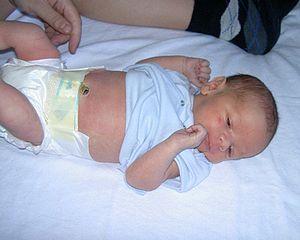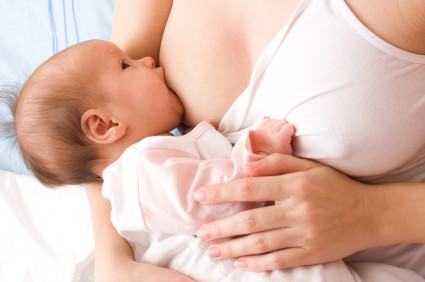Baby Vomiting Causes (After Feeding, With and Without Diarrhea)
Babies tend to frequently regurgitate after meals (possetting). Vomiting itself is more forceful and should not be taken lightly as it may be due to some underlying problem. A single episode of vomiting is not a cause for concern. However, if vomiting is persistent or occurs in frequent episodes (recurrent) then it must be investigated.
There are many possible causes of ongoing vomiting in babies, ranging from acute causes like viral gastroenteritis to serious conditions like gastric outlet or intestinal obstruction or even meningitis. In toddlers however, regurgitation may arise for other reasons like ingesting small objects, triggering the gag reflex by putting objects in the mouth and food poisoning due to their tendency to explore the environment.
Read more on persistent and recurrent vomiting.
Why do babies vomit?
Vomiting is a protective reflex, the purpose of which is to remove toxic materials from the gastrointestinal tract to prevent its absorption into the bloodstream. Irritation inside the gut can trigger vomiting and with babies this may occur for various reasons. Even movement can play a role in baby vomiting, similar to how motion sickness affects older children and adults.
Generally if vomiting is persistent or accompanied by other features like diarrhea, fever, dehydration and/or listlessness, then immediate medical attention should be sought so that the appropriate treatment can be commenced. If vomiting is occasional and the baby does not seem distressed then a wait-and-watch approach may be adopted.
Possetting or spitting up (effortless regurgitation or bringing up of breast milk or formula after a feed) is confused with vomiting. Vomiting is not an effortless activity. It is the inability to keep down food or liquids, and the forced throwing up of ingested milk, water, formula or any food through the mouth.
Causes of Baby Vomiting
Most of the conditions where vomiting is a prominent feature include :
Infection
- Gastroenteritis
Viral gastroenteritis is the most common and is usually acute. Bacterial gastroenteritis is less frequent and more often associated with poor hygiene, especially when handling dirty diapers and the baby or inadequate sterilization of feeding bottles. This type of gastroenteritis may be the result of bacterial action (food infection) or the action of bacterial toxins (food poisoning). Symptoms : Diarrhea, vomiting after feeding - Other Infections
– Ear infection
– Respiratory tract infections – pneumonia, whooping cough
– Meningitis
– Hepatitis
– Urinary tract infections
Gastrointestinal Obstruction
An obstruction within the gut usually causes projectile vomiting. Some of the causes in babies includes :
- Pyloric stenosis
- Intestinal obstruction – blocked bowel (small intestine) or blocked colon (large intestine)
- Congenital narrowing of a part of the alimentary tract.
Other Causes
For a list of possible causes, refer to Projectile Vomiting in Babies.
- Nutrition
- Over-feeding.
- Lactose intolerance
- Milk allergy
- Early introduction of solid foods
- Ingesting poisons or toxins
- Indigestion (non-ulcer dyspepsia)
- Gastroesophageal reflux disease
- Other Causes
- Prolonged bouts of crying
- Motion sickness
- Head injury
Vomiting After Every Feed
Possetting after feeds is a common occurrence. It often accompanies burping. However, vomiting after every feed may be due to :
- Pyloric stenosis. Thickening of the pylorus, which is the muscular valve between the stomach and duodenum (first part of the small intestine). It is more likely to occur in boys than in girls and is most common between 3 weeks to 6 months of age. There may be projectile vomiting approximately 30 minutes after every feed or only after some feeds. Other accompanying symptoms may include abdominal pain, constant hunger, dehydration and failure to thrive. Surgery is the treatment of choice.
- Gastroesophageal reflux disease (GERD). This may be the cause of vomiting after a feed. The lower esophageal sphincter or LES, which is the muscular ring between the esophagus and stomach that normally prevents the stomach contents from flowing back into the esophagus, is defective and may not close properly. This allows the acidic stomach contents to pass into the esophagus. With strong gastric contractions during digestion, the stomach contents may pass out into the esophagus with force. Most babies outgrow GERD by the time they are 1 to 2 years old, but it may persist in some children.
- Over feeding.
- Not burping the baby after meals.
- Milk intolerance (lactose).
Read more on vomiting after eating.
Vomiting with Diarrhea
Dehydration is likely to arise if the condition is not treated promptly and adequate rehydration therapy is not commenced. With infants, rehydration may have to be via the IV route.
- Gastroenteritis
- Food poisoning
- Indigestion
- Over-feeding
- Milk intolerance
- Intestinal obstruction. In infants, intussusception is one of the more common causes of intestinal obstruction. It is the telescoping of one portion of the intestine into the adjacent segment. Initially there is diarrhea with vomiting, followed by the typical red “currant jelly” stool.
- Poisoning
Read more on vomiting and diarrhea.
Vomiting with Abdominal Pain
It is difficult to identify abdominal pain in an infant. While toddlers may be able to express the discomfort or pain in the abdomen, younger infants may instead cry incessantly especially if firm pressure is applied on the abdomen, sometimes quieten down with light massaging of the abdomen and curl up to try to ease the pain.
- Appendicitis
- Gastroenteritis
- Pyloric stenosis
- Intestinal obstruction
- Hepatitis
- Poisoning
When to Call the Doctor
The following conditions should prompt medical attention.
- Vomiting lasting more than a few hours.
- Vomiting accompanied by diarrhea.
- Vomiting with fever above 100°F.
- Not passing urine for more than 6 hours.
- Signs of dehydration such as dry lips and mouth, dry skin, crying without tears, excessive sleepiness, depressed fontanelle (the soft portion on the skull in babies), loss of skin turgor (felt by pinching up the skin on the abdomen – tenting of skin is seen in dehydration).
- The baby appears to be in severe pain.
- Bulging fontanelle.
- Blood in vomit or vomiting bile.
- Lethargy, confusion, irritability.
- Neck rigidity.
- Shortness of breath.
- Vomiting after a head injury.
Treatment of Baby Vomiting
Treatment will be directed at the cause of vomiting and breastfeeding should not be stopped during this time. Dehydration should be prevented or at least identified early. If vomiting eases, an oral rehydration solution (ORS) may be given to replenish the lost fluid and electrolytes caused by vomiting and accompanying diarrhea if present.
Liquids and solid feeds may be stared gradually as the baby’s vomiting settles. No medication should be given without the doctor’s advice. Avoid using anti-emetics in children unless advise by a pediatrician.
Infants, both breastfed and bottle fed, have a tendency to regurgitate milk for various reasons, many of which are not due to any disease process. This effortless regurgitation or spitting up of milk is known as possetting. With vomiting, the regurgitated contents are pushed out with force. In cases where the vomiting is persistent or recurrent and accompanied by other problems like the inability to gain weight and thrive, listlessness, fever, diarrhea, difficulty breathing or signs of dehydration needs to be investigated and managed by a medical professional.






